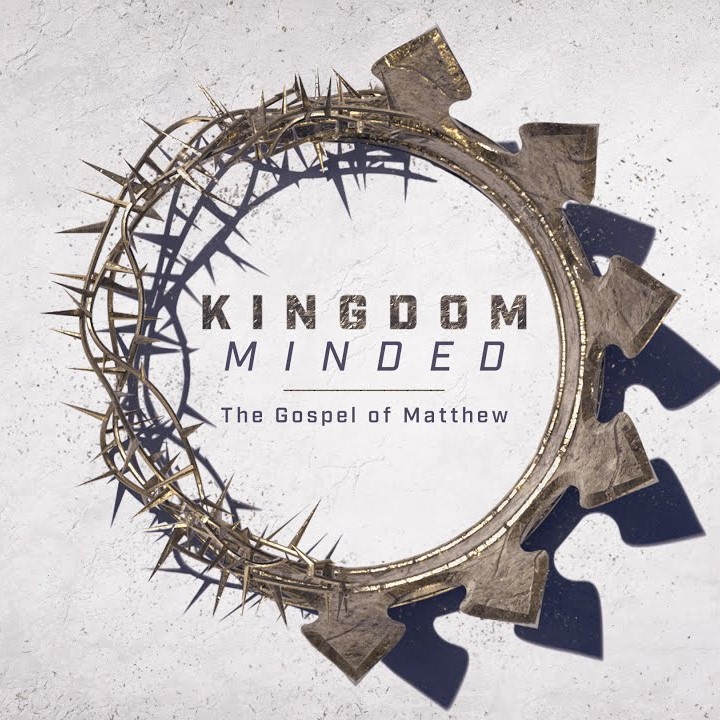[00:00:01] Speaker A: Hey, thanks so much for listening to this message. My name is Jason, and I'm one of the ministers here at the Madison Church of Christ. It's our hope and prayer that the teaching from God's word you hear today will bless your life and draw you closer to him. If you're ever in the Madison, Alabama area, we'd love for you to worship with us on Sundays at 830 or 10:30 a.m. if you have any other questions about the Bible or want to know more about the Madison church, find
[email protected] dot. Be sure to also check out our Bible study podcast, Madison Church of Christ Bible studies. Thanks again for stopping by.
[00:00:37] Speaker B: What are you worried about?
I know that's a loaded question. We all have our own worries. We all kind of. Our hearts kind of skip to beat whenever I ask that because we all thought about what we're worried about. But let's get a little bit specific.
What about the environment? I know that in Yellowstone we just had a. I believe it was a hydrothermal explosion.
Are we worried about our environment?
Let's get a little bit more, I guess, political here. Are we worried about our economic state as a country?
What about our political state? I know it's a hot topic issue right now.
Maybe let's go a little bit more personal.
I know here in Madison, which is insane to think about.
School starts back in four days.
That is insane to think about to me, because y'all start back August 1. That. No, that's not real.
But parents, kids, teachers, are you worried about that? I know for me personally, I'm about to enter my last week here at Madison in this internship, and I've been incredibly grateful for everything that y'all have given me and equipped me with. With this summer.
But right after this, I head back to Harding to start my senior year.
Then after that, in December of 2025, I will graduate, hopefully.
And after that, I will enter the job market and search for jobs.
Great. Yeah.
So maybe. Maybe you're just worried about other people's perceptions of you. Maybe you're worried about your image.
I ask all this not to purposely raise my blood pressure or your blood pressure or our heart rates or anything like that, but I just really want to get you thinking about just how many worries you have in your life right now.
But what is worry?
Worry, by definition, is a sequence of repetitive thoughts and mental images focused on threatening issues that have uncertain but likely negative outcomes.
To simplify worrying is thinking about the things you don't want.
But now I want to ask this question. Why do we worry? Worry is putting ourselves in this negative mental state, thinking about the future or about things that are right around the corner.
Towson University went in depth to talk about what worry is, and there's two ways that we worry.
The first one is so that we feel emotionally prepared. We use it as a brace of sort. We put ourselves in this negative mindset so that whenever the negative happens, our mood doesn't change. We prepare ahead of time for it. I know for me personally, I've done this before, talking about my greek class. I know I've mentioned it once, I'll mention it again.
I remember worrying that entire class, first off. But I remember specifically, there was one test that I worried about more than any others, and it was the first one.
And I remember taking that first test. And my parents can attest to this. I called them after I took it. I got out of that class and I called both of them and I said, it's very possible that I got a 30.
I was. It was not a good grade. I knew it. It was not going to be my best moment, for sure.
But for the next week or so, I stewed over what this possible grade would be and what it would like, feel like whenever it hit my gradebook in canvas and whenever I got that notification of assignment graded. And finally, after about a week, that notification did come in and it hit. And I remember looking at it and I was like, I really don't want to open this, but we're going to. And so I opened it and I didn't get a 30.
Did pretty bad, but didn't get a 30.
And so I. And then whenever we look at the other option here, we associate worry with problem solving. A lot of us, whenever we think of it this way, we look at it as more of a.
How to put it? An emergency fund.
How many of y'all have an emergency fund?
It's something that we have for just in case everything goes wrong.
If our car breaks down, if we happen to get robbed, if whatever happens, we have money to put down that we've set aside.
We use this negative space of worry to try and tackle every possible what if? Scenario that can come up. Sometimes this works great, other times not. We all know those people that are preparing for, like, the apocalypse scenario. They've got the underground bunker, they've got the canned food, everything ready for whenever everything hits the fan.
But to some of us, that makes sense.
Most of us probably not.
But we can assume that worry was something that Paul felt needed to be addressed to the Philippians. In Philippians four, four, six, Paul helps give them an answer and shows it to the church. If we put it in today's terms, we kind of look at it as a three point sermon. Worry about nothing. Pray over everything and give thanks for anything.
Verses four and five cover the most of this, specifically, the worry about nothing. Paul mentions the opposite of worry in all of Philippians, 13 times, split between two greek words, chara and Karen. If we were to translate them, they mean joy and rejoice. And that's really the theme of this book. That's what our sermon series this summer has been about. The opposite of worry is joy.
Whenever we get into this next verse, rejoice in the Lord always. Verse four again, I will say rejoice.
We can see from this verse alone that rejoicing is important. But it's important because we see the two rejoices in there. It's repeated. And whenever we see repetition, we have to understand importance.
But we all know what rejoicing is. We sang a lot of songs this morning about rejoicing. But what is rejoicing? Well, I hate to let y'all down. Rejoicing is the act of showing joyous. I feel like we all could have came to that conclusion one way or another. And we all sort of know what joy is. We've heard about joy. We've heard about rejoicing. And whenever we look at that text, we see that Kara and Karen, they're so similar to that Greek, that English.
And so whenever we look at, we're supposed to have joy in everything that we do, everything, every aspect of our lives, we are supposed to have this joy. But let's face it, nothing. All things in our life are good.
We will meet rough times. We will have our struggles. So how do we rejoice in the bad?
In order to understand that, we have to understand something critical about rejoicing and joy in general. And I think we kind of get it twisted in our heads sometimes. Joy is not happiness.
They can relate, but they are not the same.
And if rejoicing is this act of showing Joy and joy isn't happiness, then what is joy?
Joy is the inner confidence that God is by our side and will take care of us whenever we need his help. And we need his help all the time.
We have to trust in God and believe that God knows what's best for us and how to handle our current situation, whatever situation we may be in. By this definition of joy being the inner confidence, we can see why joy is talked about as the opposite of worry. Not only that, but Joy can be called the antithesis and the antidote to worry.
When we have joy, we are handing our worries to God by saying that we trust him to handle our worries according to his will for us.
But there is a line to draw here. When we have our worries and we give them to God, it's not a football handoff. We don't just have our worries in our hand and give them to the running back that is God and watch him take off. That's not how this works. And if you're not a football person, I'll give you another analogy.
Whenever you go to bed at night and you pray, and you may have this fear of being robbed, if you pray to God and say, please protect me from any robbers, and then you go to bed knowing that your door is unlocked, what good is that? It bridges all. It just throws away all nonsense and all logic.
There is important physical preparation that has to take place along with the spiritual. If there's something that can be done to prevent our worries, then take preventative action.
And when our worries are beyond our preventative actions, we have to give those worries to God and trust that he will help us through it all.
Then we get to one of the most difficult parts of verse four. And that's right smack dab in the middle, that always we are called to rejoice in all that God is doing in our lives, in every situation that we may encounter. We're told in this passage that in everything that happens, in everything that we do, we are supposed to have the confidence that God is in control of our lives and that he will lead us to where we need to be.
One of the places that I see this the most is in Peter, in Matthew, chapter 14, verses 22 33. Most of you know this passage of Jesus walking on the water.
It reads, immediately he made the disciples get into the boat and go before him to the other side while he dismissed the crowds. And after he dismissed the crowds, he went up on the mountain by himself to pray to. When evening came, he was there alone. But the boat by this time was a long way from the land, beaten by the waves, for the wind was against them. And in the fourth watch of the night, he came to them walking on the sea. But when the disciples saw him walking on the sea, they were terrified and said, it is a ghost. And they cried out in fear. But immediately Jesus spoke to them, saying, take heart. It is I, do not be afraid. And Peter answered him, Lord, if it is you command me to come to you on the water? And he said, come.
So Peter got out of the boat and walked on water and came to Jesus. But when he saw the wind, he was afraid and beginning to sink. He cried out, Lord, save me.
Jesus immediately reached out his hand and took hold of him saying to him, o you of little faith, why did you doubt?
And when they got into the boat, the wind ceased and those in the boat worshiped him saying, truly you are the son of God.
Now let's break this down for a second. The disciples were on some rough waters, not having a great time. Then they see this figure standing on the water. They saw the impossible. They saw something standing on water. So they rationalized it.
They just went, okay, it's a ghost.
And they were terrified of it. But Jesus called out and said, hey, it's me. It's Jesus. So now the disciples are seeing a real living person with actual weight standing on water.
If you're anything of a science person you know that that's not possible. Even if you've swam in a pool you know that that's not possible.
But we've seen Jesus do the impossible before. I mean, earlier in Matthew 14, right before this passage we see Jesus feed the 5000.
But then Peter asks Jesus to call him out.
And Jesus says, come on out. Now we see Peter, a fisherman, someone who by all accounts would know exactly the properties of water and just how impossible what he was about to do was.
Walk on water.
And I want to pause there for a second because do we really realize how crazy that is?
Because by all intents and purposes all logic, all physics, all science, all of that is impossible.
And I feel like whenever we've been raised in the church and we've read these stories so many times we just kind of brush this under the rug of like, yeah, Jesus and Peter walked on water.
There's a lot of other stuff too.
But now we see Peter standing on this water and making his way to Jesus.
But we all know Peter didn't stay on the top. At some point during his walk, Peter looked around and stopped looking at the one who was keeping him up and started to worry about the events around him. I imagine Peter saying things like, what if I sink? What if this wind or these waves push me over and I fall? Am I too far away from the boat to make it back before I drown? I can imagine Peter standing in between Jesus and the boat not being at either yet and saying, I'm on my own out here.
Then Peter finally did start to sink and in a turn of desperation, Peter looks to the Lord and asks him to save him. And when Jesus did save Peter, he looked at him and said, o you of little faith, why did you doubt?
Isn't that what worry is?
Just doubt that God can handle it? Because when we worry about something, we are essentially saying that we don't think that God can handle it. We think that our problem is too big or there's too many for God. And when we finally start to drown in these worries, we send that Hail Mary to God of asking him to help us.
But what we don't focus on in this passage is verse 32 and how Jesus calms the seas after they get back into the boat. Could you imagine Peter looking around at the seas around him after he got back in the boat, as calm as can be when just moments before he was thinking they were going to swallow him whole?
Earlier, when Peter saw that wind and those waves, he was worried that he was going to make it through. Then after he did make it through with the help of God, he looked back and realized just how miniscule those problems were because God was in control the whole time.
Sometimes we can look at the problems around us and think that there's no way that we're making it out of here.
My worries are just too big. There's too many to count. We're immobilized by the fear of what could be.
When we look to God and say, I give you my worries, help me get through to the other side, and he follows through, we can look back and see just how inflated we made those problems in our minds because God was in control the whole time.
So when we are rejoicing, it doesn't necessarily mean that we're happy about every single situation that we find ourselves in. When we're rejoicing, we are putting our trust and our confidence in God that he will help us get through to the end and that everything we do will be in accordance with his will for us.
Rejoicing is the first part of learning how to worry about nothing. The next is in verse five.
Let your reasonableness be known to everyone. The Lord is at hand.
The word reasonableness here is translated a lot of different ways by a lot of different translations of the Bible, just to name a couple. You have gentleness, reasonableness, big heartedness. But the one that I found that sort of encompasses this entire meaning of the word is moderation.
The idea of moderation goes back to having our confidence in God. Moderation describes the heart of a person who is willing to let God fight their battles. Moderation describes someone who takes romans 1219 to heart, where it says, beloved, never avenge yourselves, but leave it to the wrath of God, for it is written, vengeance is mine, I will repay, says the Lord.
Moderation describes a person who is really free to let go of his or her worries and anxieties because they know that God will go to bat for them.
When we let go of these worries and anxieties that we have, we become more balanced people to the world, people that don't jump to the extremes whenever something happens that would really just mess with our day. But why does Paul tell us to show that moderation?
When we let our moderation show to the world, we show balance. We show balance in our lives that only the Lord can provide for us. We are shown to the world as stabilized individuals that understand that whatever happens, the Lord is by our side and that we'll make it out the other side.
When we look at the second sentence in this verse, the Lord is at hand. There's two different ways that it can be interpreted and is interpreted by different commentaries, and I think both are very important for this topic. The first one talks about that the Lord is by our side in everything that we do, that the Lord is at hand. When we're going through our struggles and we're starting to worry, we can have joy in that God is right by our side, ready to take our problems into his care.
This other way to interpret the Lord is at hand is talking about how we are not promised tomorrow.
So why are we worrying about tomorrow? The only thing that is guaranteed regarding our life is the current moment that we're living in. So live in it.
Matthew 625 27 says, therefore, I tell you, do not be anxious about your life, what you will eat or what you will drink, nor about your body, what you will put on. Is not life more than food and the body more than clothing? Look at the birds of the air. They neither sow nor reap nor gather into barns, and yet your heavenly Father feeds them. Are you not of more value than they? And which of you, by being anxious, can add a single hour to his span of life?
When we look at creation as a whole, we see something very interesting, and that is that God made everything in perfect unison. Jesus here in Matthew six, tells us to look at the birds of the air and how God provides for them and gives them opportunities for food.
We can look at every aspect of God's creation and see just how God is working through them.
God cares for all creation, which he called good how much more do you think he's going to care for the only creation that he made in his image that he calls very good?
Worry about nothing because God is by our side, ready to take every worry that we have away so that we can live a completely uninterrupted, joyous life serving him in everything that we do.
Next verse, verse six. Do not be anxious about anything, but in everything by prayer and supplication with Thanksgiving, let your requests be made known to God.
We're going to focus on that underlined section of do not be anxious about anything for a second because it's worded pretty cut and dry. But notice that it's structured as a command, not a request.
Not only that, but Paul uses the word anything. Again here at the end. There is absolutely no worry that we have that is too small for God. We are called to give every worry and every care that we have directly to him and trust that he will take care of it.
Now, if you are anything like me, there has been a question nagging at the back of your heads this whole time of how do we do that? How do we practice the act of identifying the things that we are worried about and then giving every last one of those worries to God without picking them right back up afterward?
A lot of times when we pray to God for help in our current situations, I kind of find myself, and I can imagine you guys do, too, of saying, okay, now that I've asked God for help with my problems, how do I solve my problem?
We don't give it up. We act like we do, we say we did, and then we just take it back in our pockets and keep it there.
We need to realize that that's not how this works. We have to lay our worries at God's feet and learn to leave them there. Learn that God will take care of our worries, whatever they may be. And the best way that I think we can do that is by living a day to day life.
If we go back to Matthew six and skip down to verse 34, we see that Jesus addresses this as well. Therefore, do not be anxious about tomorrow, for tomorrow will be anxious for itself. Sufficient for the day is its own trouble.
There is an anonymous quote that was made famous by Eleanor Roosevelt, and it says, yesterday is history, tomorrow is a mystery, but today is a gift. That is why it is called the present.
Now, if you are anything like me, you may know this quote from another source, one that is a little bit more pop culture yemenite, and that is Master Oogway from kung fu Panda.
But when we choose to live a day to day life, we are choosing to limit what we worry about to what can be done in the day.
The famous let go and let God line comes to mind when I think of this. When we are completely and utterly focused on mirroring Christ in our everyday life, in every moment of our lives, we have to focus on what we can do in the moment.
What can we do to be more like Christ? What can I do at work, school, the store to show more of that image of Christ?
We're going to go on to the next part of verse six and read, but in everything by prayer and supplication, let your requests be made known to God. This is getting into that pray over everything section, and that is whenever we read the by prayer and supplication. We know what prayer is. Prayer is used here as like a general term for our communication with God. But there's this word supplication. Supplication is what I call a church word.
We hear it all the time. We may not necessarily know what it means, but it's like, yeah, we got that. Supplication is the act of humbly asking God for something or for God to do something for us. And if you notice, it says prayer and supplication. Sometimes we kind of group in supplication with prayer, but Paul makes it noted here that they are two separate things and we are supposed to do both.
We aren't just supposed to give God our to do list. I say that because as Christians, I feel like that's what we do most of the time. We just ask God for stuff and we say, hey, I hope you got all that waiting for the results.
When was the last time you talked to God?
I mean really talked to talk to him like he's a good friend because that's what he is and that's what he wants to be for us. When was the last time you talked to God? Like you would write a journal entry because God wants to hear from us like that.
Going back to Matthew 631 33, we read, therefore, do not be anxious, saying, what shall we eat? Or what shall we drink? Or what shall we wear? For the gentiles seek after all these things, and this is the big part, and your heavenly Father knows that you need them all.
But seek first the kingdom of God and his righteousness, and all these things will be added to you.
This passage states that God knows exactly what we need, but that doesn't mean that we don't have to tell God about them. In fact, Paul says here in Philippians that we should express those needs to God. Because just because God knows what we need doesn't mean that we have trusted God to provide those needs. That's why expressing our needs and our desires to God is so important. And by expressing our needs to God, we are trusting God to take care of us.
By praying over everything, we relieve our worries and anxieties by trusting that God will take care of us and leave it in his care.
But there is a difference between coming to God like he's a vending machine or a genie in a lamp and coming to God like he's our friend. So what's the difference?
That little part that I left out in verse six, that with Thanksgiving, this looks like on the surface that it's just kind of mentioned in passing. I mean, it's only two words, but it is pivotal when it comes to our prayer life.
Prayer and supplication relieves our worries by trusting. But Thanksgiving relieves our worries by accepting and understanding that our circumstances are from a loving goddess.
I talked earlier about using God as a vending machine or a genie in the bottle. I mean that. And a lot of times when we pray, we ask for a lot of things.
We ask for the sick to be healed. We ask for a good day tomorrow. We ask for the half pound burger we are about to go and eat to nourish our bodies.
Maybe we ask for some more personal stuff. I know I've prayed these before. God, I really need some help on this test that I found out was tomorrow when I thought it was a week from tomorrow.
God, please help me find the right one. If this is the right one, give me a sign. God, help me get out of my current sinful situation, whatever that is.
We use prayer as a way of updating God on our current agenda and goals for our lives.
But prayer isn't about God aligning his heart with us. Prayer is about aligning our hearts with him.
I'm gonna say that again. Prayer isn't about God aligning his heart with us. Prayer is about aligning our hearts with him.
When we give thanks in our prayers, we are taking note of every single thing that God has given us in this life and humbling ourselves to understanding some sort of the portion of the plan that God has for us. And when we're able to take that step back and give thanks for the things that we have in this life, we are taking the time to see the vision that God has for us.
By giving thanks for anything. We are taking notice of the things that God has blessed us with and the joy that comes from that.
So to recap, Paul tells the church at Philippi to worry about nothing, pray over everything and give thanks for anything.
And what happens when? When we do that? And that's where we get to verse seven. And the peace of God, which surpasses all understanding, will guard your hearts and minds in Christ Jesus.
Paul is saying here that when we do these things, when we have this joy, when we have let our worries and our anxieties go, and when we have acknowledged the plan for God that God has for us in this life, God will grant us peace.
When was the last time you felt at peace, truly peaceful in the world? Can you even remember?
The world and the media make it to where it's nearly impossible today? Someone is always at someone else's throat, and it's everyone else's problem.
Paul is saying that even amidst all of the chaos of the world, if we worry about nothing, pray over everything and give thanks for anything, God will protect us with the peace that he provides. We will be secure in the peace of God.
Now, I'm by no means saying that the things that I'm talking about this morning are easy to apply to ourselves. Believe me when I say it's a lot easier for me to be up here talking about hey, don't worry, than to actually do it.
So how can we practice this? Paul, in verses eight through nine, give us a great starting point where it says, finally, brothers, whatever is true, whatever is honorable, whatever is just, whatever is pure, whatever is lovely, whatever is commendable, if there is any excellence, if there is anything worthy of praise, think about these things, what you have learned and received and heard and seen in me. Practice these things and the God of peace will be with you.
We have to think and practice optimism.
When those negative worries come into our heads, we have to spin them around, look at the facts about the situation, then look at the good.
It does us no good to keep looking at the things that are bad. All of the negative things in the world do is make us negative people.
And negativity is a deadly virus.
Not only that, but Paul says to find those positive people that you have in your life and imitate them. Be the people that show that optimism, that show the good of the world. Paul is saying, find those positive christian people in your life and be that positive christian person in another person's life. Find those people that have joy, that do everything in moderation and reasonableness and do the same.
Maybe this morning you're worried.
It doesn't matter about what, but you're worried you're having a hard time letting go of that worry that you may have and you can't seem to get out of this downward spiral that you're in.
Maybe you need to give your worries to God, but you feel like you need the prayers and encouragement of the church family here to let go.
If you need help doing that this morning, we are more than happy to help you with experiencing the joy and the peace that come with letting go. If there's anything you need this morning, please come. As we stand and as we sing.





